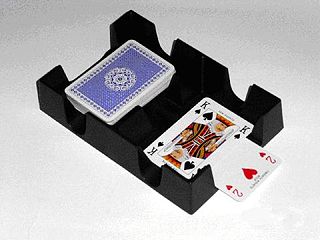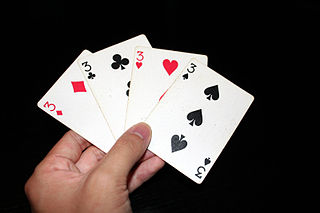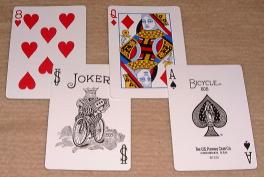"Riding the Bus"
The dealer then turns a card in the furthest row of the Bus. All players with a card with the same face value may choose to play as many as they have and then discard the played cards. If a player has a playable card, they nominate any other player to take a drink of the victim's choice. If the card turned over was from the bottom row (4 cards), the player with a playable card can nominate another player to take one drink. Each successive row increases the amount of drinks the nominated player can be forced to take (or the drinks can be distributed amongst several players at the player with the playable card's discretion). Ex. If a player with a playable card plays his/her card in the last row of the bus containing only 1 card, the player can nominate 1 player to take 4 drinks or nominate several players to take a drink.
Play continues with the Dealer gradually showing every card in the Bus, being sure to empty each row before uncovering the next.
The game ends once the card in the bottom row of the Bus has been acquired. The player with the most cards remaining will continue playing from the beginning using the alternate deal until he/she guesses the answer correct.
Aces are neither high and low. Drawing an ace immediately requires a drink and restarts the round. This rule originated in Nova Scotia and has been followed since the mid 90s.

Crazy Eights is a shedding-type card game for two to seven players. The object of the game is to be the first player to discard all of their cards. The game is similar to Switch and Mau Mau.

500 rum, also called pinochle rummy, Michigan rummy, Persian rummy, rummy 500 or 500 rummy, is a popular variant of rummy. The game of canasta and several other games are believed to have developed from this popular form of rummy. The distinctive feature of 500 rum is that each player scores the value of the sets or cards they meld. It may be played by 2 to 8 players, but it is best for 3 to 5.
Thirty-one or Trente et un is a gambling card game played by two to seven people, where players attempt to assemble a hand which totals 31. Such a goal has formed the whole or part of various games like Commerce, Cribbage, Trentuno, and Wit and Reason since the 15th century.
Escoba is a variant of the Italian fishing card game Scopa, which means "broom", a name that refers to the situation in the game where all of the cards from the board are "swept" in one turn. The game is usually played with a deck of traditional Spanish playing cards, called naipes.

Cassino (US) or Casino (Europe), is a fishing card game, often said without substantiation to be of Italian origin, for two, three, four, or even theoretically five players. It is the only fishing game to have penetrated the English-speaking world. It is mostly played by two with a standard deck of playing cards, the object of the game being to score 21 points by fishing up cards displayed on the table. It is very similar to the later Italian game Scopa.
The game of Bartok, also known by a number of other names, such as Wartoke, Warthog, Bartog, Bentok, Last One Standing or Bong 98, is a card game where the winner of each round invents a new rule which must be obeyed for the remainder of the game. It belongs to the "shedding" or Eights family of card games, whereby each player tries to rid himself of all of his cards. The game progresses through a series of rounds with a new rule being added in each round, thus making the game increasingly complex as it progresses. These newly introduced rules may modify any existing rules.

Rummy is a group of matching-card games notable for similar gameplay based on matching cards of the same rank or sequence and same suit. The basic goal in any form of rummy is to build melds which consist of sets, three or four of a kind of the same rank; or runs, three or more cards in sequence, of the same suit. If a player discards a card, making a run in the discard pile, it may not be taken up without taking all cards below the top one. The Mexican game of Conquian is considered by games scholar David Parlett to be ancestral to all rummy games, which itself is derived from a Chinese game called Khanhoo. The rummy principle of drawing and discarding with a view to melding appears in Chinese card games at least in the early 19th century, and perhaps as early as the 18th century.
Pitch is an American trick-taking card game derived from the English game of All Fours. Historically, Pitch started as "Blind All Fours", a very simple All Fours variant that is still played in England as a pub game. The modern game involving a bidding phase and setting back a party's score if the bid is not reached came up in the middle of the 19th century and is more precisely known as Auction Pitch or Setback. Whereas All Fours started as a two-player game, Pitch is most popular for three to five players. Four can play individually or in fixed partnerships, depending in part on regional preferences. Auction Pitch is played in numerous variations that vary the deck used, provide methods for improving players hands, or expand the scoring system. Some of these variants gave rise to a new game known as Pedro or Cinch.
Speed is a game for two players or more of the shedding family of card games, in which each player tries to get rid of all of his or her cards first.

Craits is a shedding card game for two to five players. It was invented in the 1970s in Cambridge, Massachusetts, and is derived from Crazy Eights, which forms the origin of its name.
Yaniv, also known as "Jonny" "Dhumbal", "Jhyap", “Jafar”, "Staki", in Québec or "quién va?" in Mexico and “Caramba” in Australia, is a Nepalese card game popular in Israel. It is similar to Blackjack, with several notable differences: one variation of the game involves five players, rather than the two-player standard of traditional Blackjack. the game is considered a backpackers game in Israel, and it's popular among soldiers and young adults returning from long backpacking trips.
Switch, also called Two Four Jacks or Irish Switch, or Last Card, in New Zealand, is a shedding-type card game for two or more players that is popular in the United Kingdom, Ireland and as alternative incarnations in other regions. The sole aim of Switch is to discard all of the cards in one's hand; the first player to play his or her final card, and ergo have no cards left, wins the game. Switch is very similar to the games UNO, Flaps and Mau Mau, both belonging to the larger Crazy Eights or Shedding family of card games.

Biriba is the Greek partnership version of a rummy card game of Italian origin called Pinnacola. The Greek name comes probably from the Italian game Biribara, or Biribisso, or Biribi, even if this game is totally different. It is played by two to six players, with two decks and 4 Jokers comprising 108 cards. If 6 players play, one more deck and two jokers more are added. Biriba can also be played by three players with or without partnership rules.
304, pronounced three-nought-four, is a trick-taking card game popular in Sri Lanka, coastal Karnataka, Tamil Nadu and Maharashtra, in the Indian sub continent. The game is played by two teams of two using a subset of the 52 standard playing cards so that there are 32 cards in play.
Screw is a card game where the players try to be the first to lose all their cards. Like Palace, it is derived from the Finnish card game Paskahousu.
Three thirteen is a variation of the card game Rummy. It is an eleven-round game played with two or more players. It requires two decks of cards with the jokers removed. Like other Rummy games, once the hands are dealt, the remainder of the cards are placed face down on the table. The top card from the deck is flipped face up and put beside the deck to start the discard pile.

Continental Rummy is a progressive partnership Rummy card game related to Rumino. It is considered the forerunner of the whole family of rummy games using two packs of cards as one. Its name derives from the fact that it is played throughout the continental Europe, the United States, Mexico, Canada, and also in South America. According to Albert Morehead, it was "at one time the most popular form of Rummy in women's afternoon games, until in 1950 it lost out to Canasta."
Around the world is a card-based drinking game, similar to president, but more complex and at the same time quicker. The game requires one standard (52-card) deck of playing cards. More decks can be added to accommodate additional players and increase difficulty.

Ponytail Canasta is a variation of the card game Canasta. The rules for Canasta were standardized in North America around the 1950s, it was this version of the game that gained worldwide popularity. In many countries, Classic Canasta is still played in more or less its original form, sometimes alongside a number of variations.
Egyptian Ratscrew, also known as Slap, Egyptian Ratkiller, Egyptian War, or ERS, is a card game of the matching family of games. The game is similar to the 19th-century British card game Beggar-My-Neighbour, with the added concept of "slapping" cards when certain combinations are played, similar to and perhaps borrowed from Slapjack.








